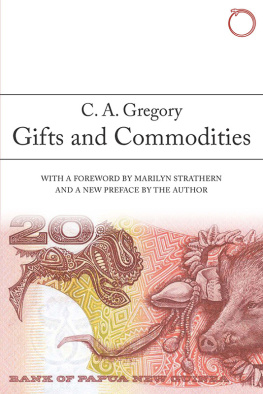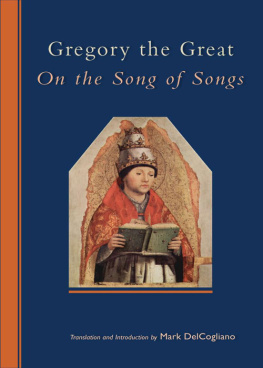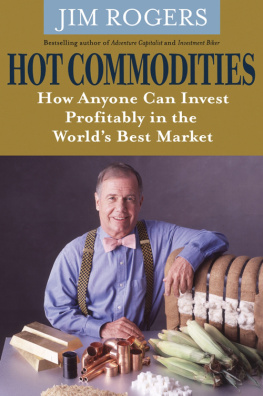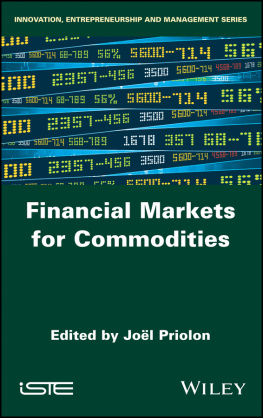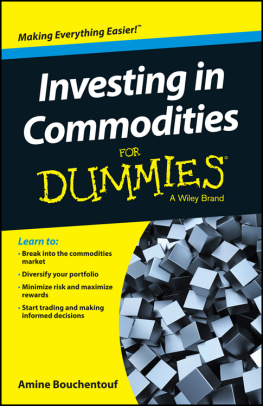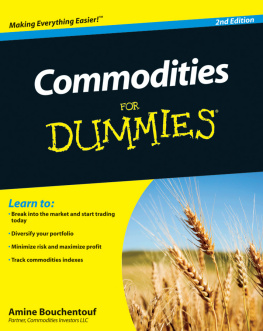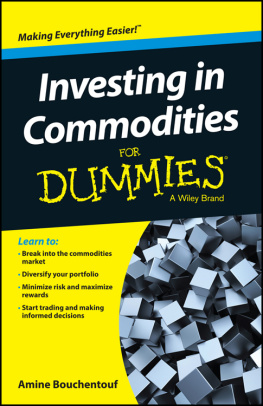Gregory C. A. - Gifts and Commodities
Here you can read online Gregory C. A. - Gifts and Commodities full text of the book (entire story) in english for free. Download pdf and epub, get meaning, cover and reviews about this ebook. City: Papua New Guinea, year: 2015;2018, publisher: HAU, genre: Politics. Description of the work, (preface) as well as reviews are available. Best literature library LitArk.com created for fans of good reading and offers a wide selection of genres:
Romance novel
Science fiction
Adventure
Detective
Science
History
Home and family
Prose
Art
Politics
Computer
Non-fiction
Religion
Business
Children
Humor
Choose a favorite category and find really read worthwhile books. Enjoy immersion in the world of imagination, feel the emotions of the characters or learn something new for yourself, make an fascinating discovery.
- Book:Gifts and Commodities
- Author:
- Publisher:HAU
- Genre:
- Year:2015;2018
- City:Papua New Guinea
- Rating:4 / 5
- Favourites:Add to favourites
- Your mark:
- 80
- 1
- 2
- 3
- 4
- 5
Gifts and Commodities: summary, description and annotation
We offer to read an annotation, description, summary or preface (depends on what the author of the book "Gifts and Commodities" wrote himself). If you haven't found the necessary information about the book — write in the comments, we will try to find it.
Gifts and Commodities — read online for free the complete book (whole text) full work
Below is the text of the book, divided by pages. System saving the place of the last page read, allows you to conveniently read the book "Gifts and Commodities" online for free, without having to search again every time where you left off. Put a bookmark, and you can go to the page where you finished reading at any time.
Font size:
Interval:
Bookmark:

GIFTS AND COMMODITIES

Executive Editor
Giovanni da Col
Managing Editor
Sean M. Dowdy
Editorial Board
Anne-Christine Taylor
Carlos Fausto
Danilyn Rutherford
Ilana Gershon
Jason Throop
Joel Robbins
Jonathan Parry
Michael Lempert
Stephan Palmi
www.haubooks.com
GIFTS AND COMMODITIES
(second edition)
C. A. Gregory
Foreword by
Marilyn Strathern
New Preface by the Author

2015 by C. A. Gregory and Hau Books.
First Edition 1982 Academic Press, London.
All rights reserved.
Cover and layout design: Sheehan Moore
Typesetting: Prepress Plus ( www.prepressplus.in )
ISBN: 978-0-9905050-1-3
LCCN: 2014953483
Hau Books
Chicago Distribution Center
11030 S. Langley
Chicago, IL 60628
www.haubooks.com
Hau Books is marketed and distributed by The University of Chicago Press.
www.press.uchicago.edu
Printed in the United States of America on acid-free paper.
For Judy, Polly, and Melanie.
Contents
Foreword by Marilyn Strathern
Preface to the first edition
Preface to the second edition
Acknowledgments
I ntroduction
Part One: Concepts
1. The Competing Theories
2. A Framework of Analysis
3. Gifts and Commodities: Circulation
4. Gifts and Commodities: Reproduction
5. Traditional and Modern Goods: A Critique
PART TWO: THEORY
6. The Transformation of Gifts into Commodities in Colonial Papua New Guinea
7. The Transformation of Commodities into Gifts in Colonial Papua New Guinea
Conclusion
Mathematical appendix: A matrix approach to the calculus of kinship relations
References
Foreword
I had forgotten that there was still a postcard inside my copy of Gifts and commodities , sent from central India in early 1983 when Chris Gregory was doing fieldwork in Bastar. I must have given him some comments, though I cannot have known at the time quite what an influence his model of exchange relations was going to have on my own work. Writing comments once more, for this second edition, leads me to declare my interest in the book and the gratitude I owe its author. But then, again, the astonishment with which I rediscover much that I had forgotten perhaps puts me sufficiently outside that frame to offer some general reflections on what it so creatively accomplishes.
While Gifts and commodities has had far-reaching consequences in anthropology, that is not where Gregory began. He was an economist who was drawn, as Eatwells preface as original series editor made clear, to what was then a fresh concern with the analytical principles of classical political economy (as opposed to neoclassical economics). Ifin the theorizing of relations between production and consumptionthese principles allowed a historical specificity to the description of economic systems, Gregory saw that this also entailed a cultural specificity that permitted fine discriminations between (in words of the time) societies on the ground. With this came the illumination that the counterpart Marx had proposed to production and productive consumption, namely consumption and consumptive production, demanded that one think about how people replace themselves. And that is where Gregory made his anthropological turn: What had anthropologists been doing for so long but analyzing kinship systems, and what were kin terminologies but a classification of people with respect to their replacement of one another? However, the cultural shock of a colonial, and decolonizing, Papua New Guinea had come first.
The point is that Gregory had let himself be shocked. He was observing what everyone else was observing about apparently rational and irrational behaviorthese were serious topics then. Indeed it is sobering to think back on how many (neoclassical) economists, and in their own way anthropologists, were struggling with the apparent perplexities of development, motivation, and the way people invested their energies. Gregorys questions were different. It went over my head at the time, but Gifts and commodities in effect offered a brilliant way out of a conceptual impasse widespread among colleagues (myself included). His model, accounting, as good models should, for interaction between sets of relations as they impinge upon one another, might have been demonstrated in Papua New Guinea but it tackled a conceptualization generally the bane of much midcentury thinking on the matter. This was the endless adjudication of social change as though it were a matter of balancing change and continuity or identifying signs of tradition and modernity. It is not irrelevant that the only other challenger was a burgeoning Marxist anthropology.
What Gregory did is encapsulated in Chapters VI and VII, on the transformation of gifts into commodities, and of commodities into gifts. These transformations did not just hinge on a very particular moment in history, they defined it. In fact Gregory gives a wonderful account of the ripple effect of such a moment as it was recreated across different regions over time, as similar conditions came repeatedly into being. The moment was a point at which produce and labor could be (not all were) treated by Papua New Guineans as commodities while the land crucial to clan survival was not. If the clan-based system, in Gregorys words, subsidized commodity production through replacing (reproducing) produce and labor, money and other commodities in turn helped replace the basis of the clan as identified through the exploits of its members. These were especially, although not exclusively, male members, and in many areas of Melanesia the exploits were those which had long been described as gift exchange.
A political economy perspective dealt with the covarying elements of what (in the vocabulary of social science) were called systems. Given that commodity transactions were also known as exchanges, gift exchange seemed a self-evident counterpart. Much of the early part of the book is concerned with spelling out the implications of bringing gifts and commodities into systematic relation. But a hallmark of Gregorys approach is that what springs from ethnography also returns to ethnography. Concepts and their theoretical framing are here a means to description, a clearing ground, not themselves an end. While the systematization (and attendant generalization) is exactly that, what endures of Gregorys work are its extraordinary insights, both into the specificities of social life in preindependence Papua New Guinea, and of its history since colonization, and into the ethnographic preoccupations of anthropologists within and beyond that country. Exchange mechanisms involving (group) alliance, marriage prescriptions and preferences, givers and receivers, forms of reciprocity, indigenous models, and the like, were all in the air. The present-day reader will find that this book gives an unexpected route into such preoccupations. That one might add to them other preoccupations, and in the language of Melanesianists of the day this would have included sexual antagonism, and even perhaps persons and things, would be in the spirit of Gregorys sense of the way in which theoretical frameworks occupy certain niches and then exceed or extend them.
The Preface to this second edition is exhilarating in this respect. It takes us forward. The recent adventures of gifts and commodities offer a history of anthropology in microcosm, and I say anthropology, rather than economic anthropology, for the latter never completely encompassed the scope of Gregorys address. In a nutshell, what he lays out are conditions for the selfreplacement of anthropological inquiry, as the continuing and radical empirical endeavor he envisages, insofar as such replacement must always be at once a matter of changeful modeling and of changing circumstances of study. Hau Books is to be congratulated for seeing the future that this book will surely have for its new readers, including readers anew.
Next pageFont size:
Interval:
Bookmark:
Similar books «Gifts and Commodities»
Look at similar books to Gifts and Commodities. We have selected literature similar in name and meaning in the hope of providing readers with more options to find new, interesting, not yet read works.
Discussion, reviews of the book Gifts and Commodities and just readers' own opinions. Leave your comments, write what you think about the work, its meaning or the main characters. Specify what exactly you liked and what you didn't like, and why you think so.

